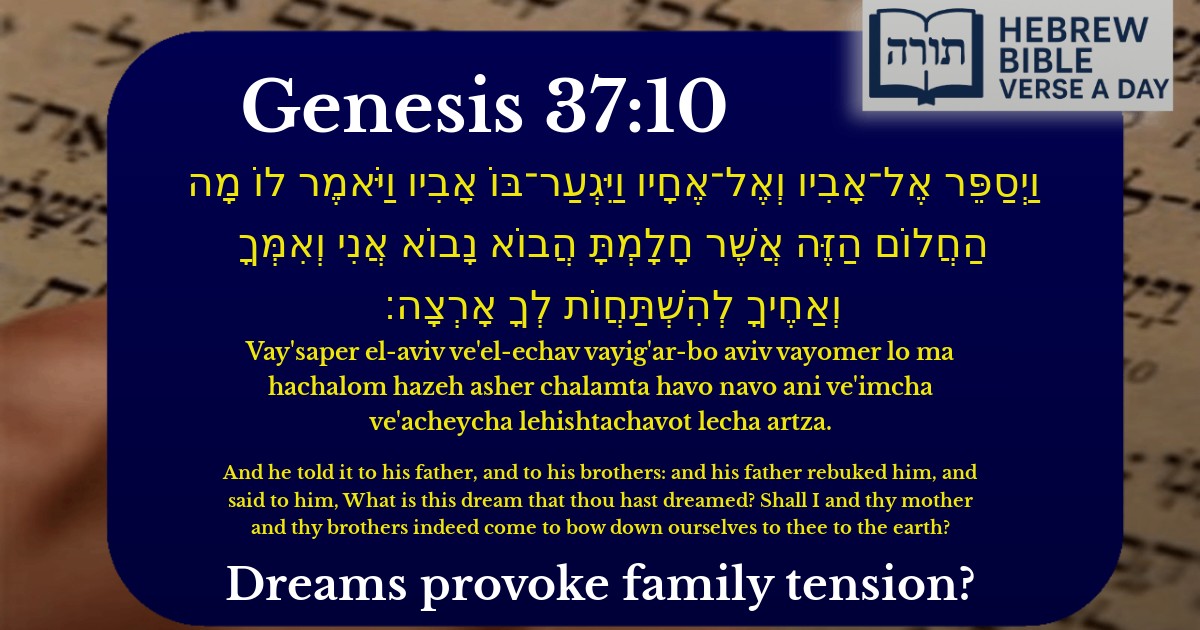Join Our Newsletter To Be Informed When New Videos Are Posted
Join the thousands of fellow Studends who rely on our videos to learn how to read the bible in Hebrew for free!
Hebrew Text
וַיְסַפֵּר אֶל־אָבִיו וְאֶל־אֶחָיו וַיִּגְעַר־בּוֹ אָבִיו וַיֹּאמֶר לוֹ מָה הַחֲלוֹם הַזֶּה אֲשֶׁר חָלָמְתָּ הֲבוֹא נָבוֹא אֲנִי וְאִמְּךָ וְאַחֶיךָ לְהִשְׁתַּחֲוֺת לְךָ אָרְצָה׃
English Translation
And he told it to his father, and to his brothers: and his father rebuked him, and said to him, What is this dream that thou hast dreamed? Shall I and thy mother and thy brothers indeed come to bow down ourselves to thee to the earth?
Transliteration
Vay'saper el-aviv ve'el-echav vayig'ar-bo aviv vayomer lo ma hachalom hazeh asher chalamta havo navo ani ve'imcha ve'acheycha lehishtachavot lecha artza.
Hebrew Leining Text
וַיְסַפֵּ֣ר אֶל־אָבִיו֮ וְאֶל־אֶחָיו֒ וַיִּגְעַר־בּ֣וֹ אָבִ֔יו וַיֹּ֣אמֶר ל֔וֹ מָ֛ה הַחֲל֥וֹם הַזֶּ֖ה אֲשֶׁ֣ר חָלָ֑מְתָּ הֲב֣וֹא נָב֗וֹא אֲנִי֙ וְאִמְּךָ֣ וְאַחֶ֔יךָ לְהִשְׁתַּחֲוֺ֥ת לְךָ֖ אָֽרְצָה׃
וַיְסַפֵּ֣ר אֶל־אָבִיו֮ וְאֶל־אֶחָיו֒ וַיִּגְעַר־בּ֣וֹ אָבִ֔יו וַיֹּ֣אמֶר ל֔וֹ מָ֛ה הַחֲל֥וֹם הַזֶּ֖ה אֲשֶׁ֣ר חָלָ֑מְתָּ הֲב֣וֹא נָב֗וֹא אֲנִי֙ וְאִמְּךָ֣ וְאַחֶ֔יךָ לְהִשְׁתַּחֲוֺ֥ת לְךָ֖ אָֽרְצָה׃
🎵 Listen to leining
Parasha Commentary
📚 Talmud Citations
This verse is quoted in the Talmud.
📖 Berakhot 55a
The verse is discussed in the context of dreams and their interpretations, referencing Jacob's reaction to Joseph's dream.
📖 Sanhedrin 102a
The verse is mentioned in a discussion about the nature of dreams and their significance, particularly in the story of Joseph and his brothers.


Context of the Verse
This verse (Bereshit 37:10) describes Yosef recounting his dream to his father Yaakov and his brothers, in which the sun, moon, and eleven stars bow down to him. Yaakov responds with a rebuke, questioning the meaning of the dream and whether it implies that he, Yosef's mother, and brothers would bow to him.
Yaakov's Rebuke
Rashi explains that Yaakov's rebuke ("וַיִּגְעַר־בּוֹ אָבִיו") was not merely a rejection of the dream but a corrective measure to prevent further strife among the brothers. Yaakov understood the dream's prophetic nature but sought to mitigate its immediate impact on family harmony. The Midrash (Bereshit Rabbah 84:11) adds that Yaakov recognized the truth in the dream but was concerned about the brothers' jealousy.
The Dream's Symbolism
Yaakov's Question: "הֲבוֹא נָבוֹא"
Yaakov's rhetorical question—"Shall I and your mother and brothers bow to you?"—hints at the dream's eventual fulfillment in Mitzrayim (Egypt), where the family would indeed bow before Yosef (Bereshit 42:6). The Kli Yakar notes that Yaakov's wording ("הֲבוֹא נָבוֹא") implies reluctance, as bowing to a son goes against the natural order, yet it would ultimately come to pass due to divine providence.
Lessons from the Incident